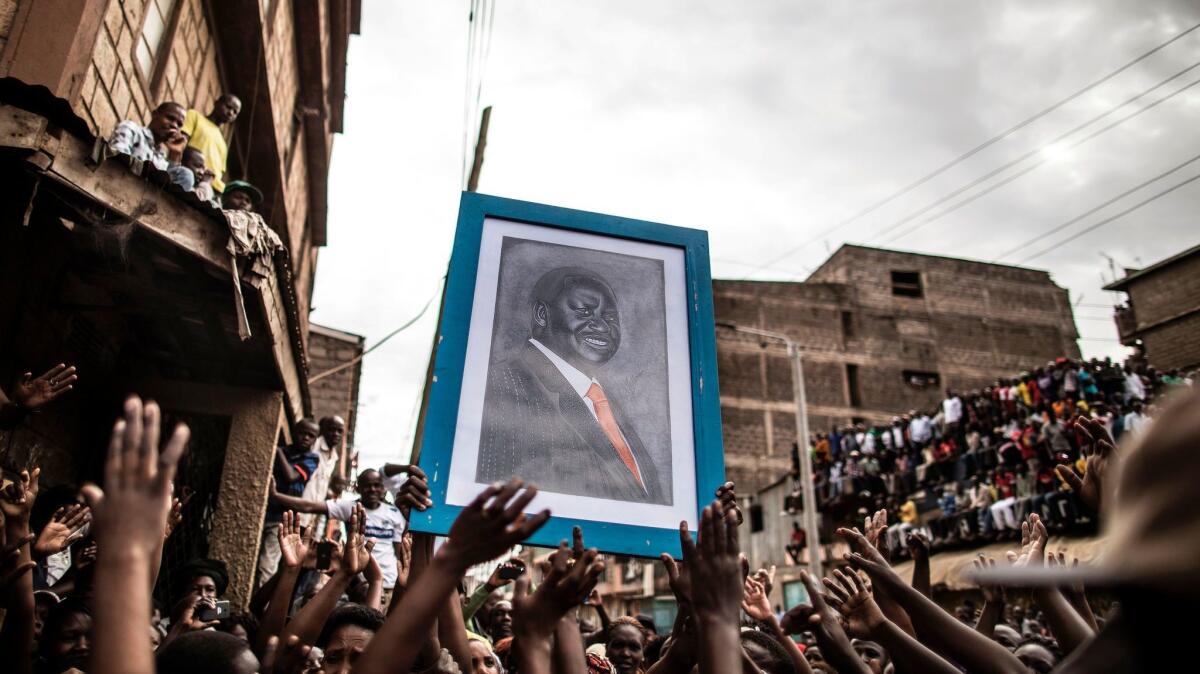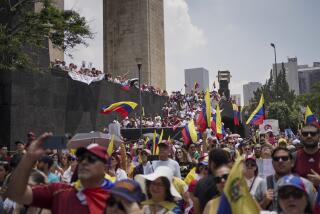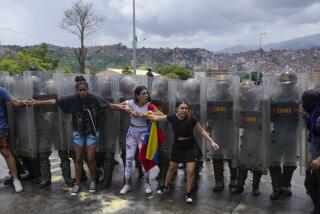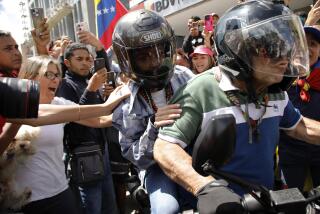Kenya’s opposition calls for a boycott to protest the deaths of 24 people in post-election clashes

- Share via
Reporting from Nairobi, Kenya — Kenya’s main opposition leader, Raila Odinga, addressed rallies of cheering supporters in two Nairobi strongholds Sunday and called for a work stoppage to protest the deaths of at least 24 people in post-election clashes with police.
“Tomorrow there is no work,” Odinga told supporters gathered in Kibera, a slum district of the capital. “We predicted they would steal the election, and that’s what happened. We are not done yet. We will not give up.”
President Uhuru Kenyatta was reelected Tuesday by a margin of 1.4 million votes, according to the Independent Electoral and Boundaries Commission. But a coalition of opposition parties says it has evidence of irregularities during the vote count and maintains that Odinga is the rightful winner.
Senior figures in the opposition National Super Alliance have ruled out a legal challenge, despite calls from international observers to resolve their complaints in court.
Calm returned to most of Odinga’s strongholds Sunday after police used live ammunition to quell protests and rioting that erupted when the official results were announced late Friday, according to Kenyan human rights observers. But there were reports of clashes between rival ethnic groups in at least one Nairobi slum after nightfall.
Manoah Esipisu, a presidential spokesman, warned that any further unrest would be dealt with by police.
“The violent protests are unlawful, so let me be perfectly clear here: The police will not tolerate breaches of the peace,” he said. “Instead, they will protect the lives and property of Kenyans, and they will restore law and order.”
Esipisu said Kenyans had made their choice and elected Kenyatta.
“It remains for us to reflect on the results and to unite in building the country,” he said. “It’s now time for us all to get back to work and move this country forward.”
Odinga, however, accused Kenyatta’s political alliance, Jubliee, of killing innocent protesters.
“As we mourn Kenyans killed by Jubilee-mandated death squads, let’s observe tomorrow as a day of mourning for the fallen patriots,” he tweeted Sunday.
Opposition officials say as many as 100 protesters were killed by police and their bodies disposed of secretly, but have produced no evidence to support their claims.
Another senior opposition leader at the Kibera rally, James Orengo, underscored the need for peaceful protests to challenge the election result.
“We want peace, but we want peace with justice,” he said. “When we call you to action, peaceful action, don’t stay behind.”
Orengo also accused Kenyan media of distorting the truth in their post-election coverage and called for a boycott of the Nation Media Group, the largest in East Africa.
Later, Odinga visited another slum district, Mathare, where he met with the family of a 10-year-old girl, Moraa Nyarangi, who was killed when police fired at protesters. His supporters crammed onto balconies and clambered onto rooftops, chanting, “Uhuru must go.”
Odinga addressed the crowd from the open sunroof of his vehicle. Afterward jubilant crowds ran alongside his convoy waving branches and shouting, “No peace.”
Clashes broke out that night between members of the Kikuyu and Luo ethnic groups in Mathare, the Associated Press reported. In a nation where political support divides along ethnic lines, Kenyatta is a Kikuyu and Odinga is a Luo. Similar violence after another disputed election in 2007 killed an estimated 1,500 people.
Odinga has been under pressure from the government and international community to call his supporters off the streets and turn to the nation’s courts for redress.
“The European Union expects the opposition to respect the results and to use legal means available for appeals and complaints,” EU foreign policy chief Federica Mogherini said in a statement late Saturday.
United Nations Secretary-General Antonio Guterres echoed the call and urged Kenya’s leaders to tell their supporters to refrain from violence.
However, a failed legal challenge to the election results in 2013 appears to have left Odinga with little appetite for that approach.
Twitter: @RobynDixon_LAT
ALSO
Departure of Syrian rebels and refugees from Lebanon raises specter of forced returns
Meet Charles Robert Jenkins, an American detained by North Korea for 40 years
What does it take to secure a border? Lessons from the wall dividing San Diego and Tijuana
More to Read
Sign up for Essential California
The most important California stories and recommendations in your inbox every morning.
You may occasionally receive promotional content from the Los Angeles Times.













